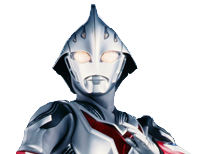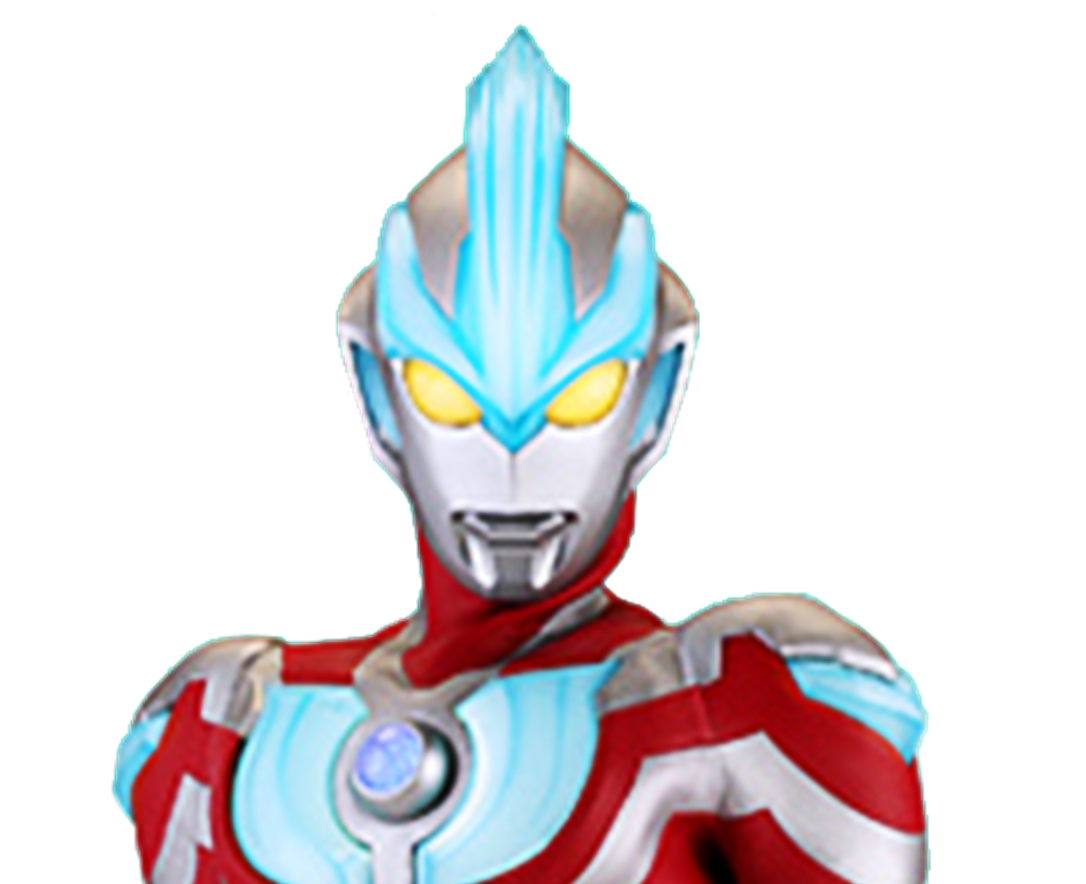The Ultra Series is the collective name for all the shows produced by Tsuburaya Productions featuring Ultraman, his many brethren, and the myriad Ultra Monsters. The Ultra Series is one of the prominent tokusatsu superhero genre productions from Japan, along with Toei produced series Kamen Rider, Super Sentai, and the Metal Heroes. The Ultra franchise is also one of the most well known examples of the daikaiju genre, which also includes Toho's Godzilla films, and Daiei Film's Gamera series.
However, the Ultra Series also falls into the kyodai (Giant Hero) sub-genre of Tokusatsu shows. Ultraman and his many kin are usually red-and-silver (although several color variations have been seen in recent years) and have glowing yellow almond-shaped dome eyes (although there are exceptions to both the shape and color) and various abilities, most notably to fire energy beams from various positions of crossed hands. The Ultra beings' main weakness is that they can only stay on Earth in giant form for a limited span of time, usually not longer than three minutes, owing to a limited supply of energy (Earth's atmosphere filters out solar energy). This is marked by a light on the character's body usually called the Color Timer, or "warning light," which eventually begins to blink with increasing frequency as his energy supply dwindles (and turns from blue to red).
Publication Information
- Title : Ultra Series
- Japanese : ウルトラシリーズ
- Labels : Collective name for all the shows produced by Tsuburaya Productions
- Featuring : Ultraman
- Myriad : Ultra Monsters
- First Series : Ultra Q
- Year : 1966
At this stage, the Ultra beings must either find a way to recharge or finish the fight as soon as possible, or involuntarily revert to human form, or worse, risk certain death. Some say another reason for Ultraman to recharge is because the Earth is badly polluted by humans, so Ultraman only has three minutes on Earth, but can survive long enough in outer space. The time limit only happens inside the Earth's atmosphere but they have none of those setbacks outside. To counter this, Ultramen almost always merge with a human host or create a human form for themselves in order to survive on Earth, more often than not reviving a recently dead person with their own lifeforce.
Ultra beings also appear to be near impossible to permanently kill, as several times an Ultra being has been killed only to be revived by another member of their species. In other cases a large enough amount of energy can be utilized to bring them back to life, usually provided by their human allies, even after being completely destroyed, as was the case with Mebius' death at the hands of Empira, only to be revived shortly thereafter by the life energy of his allies. Ultraman always try to avoid battles in inhabited areas or fighting in a place where there are innocent bystanders and try to cause the least amount of destruction as possible, from the side effects of their fights when confronting in the city, when and if they can't; a city like Tokyo would be destroyed. The Ultra-Garrison are ranked from low-tier cosmics to high-tier cosmics.
TV shows
- 1966 - Ultra Q
- 1966–1967 - Ultraman
- 1967–1968 - Ultra Seven
- 1971–1972 - The Return of Ultraman
- 1972–1973 - Ultraman Ace
- 1973–1974 - Ultraman Taro
- 1974–1975 - Ultraman Leo
- 1979-1980 - The Ultraman
- 1980–1981 - Ultraman 80
- 1990 - Ultraman : Towards the Future
- 1993 - Ultraman : The Ultimate Hero
- 1996–1997 - Ultraman Tiga
- 1997–1998 - Ultraman Dyna
- 1998–1999 - Ultraman Gaia
- 2000–2001 - Ultraman Neos
- 2001–2002 - Ultraman Cosmos
- 2004 - Ultra Q : Dark Fantasy
- 2004–2005 - Ultraman Nexus
- 2005–2006 - Ultraman Max
- 2006–2007 - Ultraman Mebius
- 2007 - Ultraseven X
- 2007–2008 - Ultra Galaxy Mega Monster Battle
- 2008-2009 - Ultra Galaxy Mega Monster Battle: Never Ending Odyssey
- 2011–2016 - Ultraman Retsuden
- 2013 - Neo Ultra Q
- 2013 - Ultraman Ginga
- 2014 - Ultraman Ginga S
- 2015-2016 - Ultraman X
- 2016 - Ultraman Orb
- 2017 - Ultraman Zero: The Chronicle
- 2017 - Ultraman Geed
- 1984 : Ultraman Kids' M7'8 Movie
- 1986 : Ultraman Kids' Proverb Stories
- 1991–1992 : Ultraman Kids : 30 Million Light Years Looking for Mama
- 1967 : Ultraman Compilation Film
- 1969 : Ultraman, Ultraseven : Great Violent Monster Fight
- 1974 : The 6 Ultra Brothers vs. the Monster Army
- 1979 : Ultraman Compilation Film
- 1979 : Ultraman : Great Monster Decisive Battle Compilation Film
- 1984 : Ultraman Zoffy : Ultra Warriors vs the Giant Monster Army
- 1984 : Ultraman Story (1984)
- 1987 : Ultraman : The Adventure Begins
- 1990 : Ultra Q The Movie : Legend of the Stars
- Ultraman Wonderful World (30th Anniversary Anthology)
- 1996 : Revive! Ultraman Compilation
- 1996 : Ultraman Company : This is the Ultraman (Wacky) Investigation Team (Anime)
- 1996 : Ultraman Zearth
- 1997 : Ultraman Zearth 2 : Superman Big Battle - Light and Shadow
- 1998 : Ultraman Tiga & Ultraman Dyna : Warriors of the Star of Light
- 1999 : Ultraman Tiga & Ultraman Dyna & Ultraman Gaia : Battle in Hyperspace
- 2000 : Ultraman Tiga : The Final Odyssey
- 2001 : Ultraman Cosmos : The First Contact
- 2002 : Ultraman Cosmos 2 : The Blue Planet
- 2003 : Ultraman Cosmos vs Ultraman Justice : The Final Battle
- 2004 : Ultraman The Next
- 2006 : Ultraman Mebius & Ultra Brothers
- 2008 : Superior Ultraman 8 Brothers
- 2009 : Mega Monster Battle : Ultra Galaxy The Movie
- 2010 : Ultraman Zero : The Revenge of Belial
- 2012 : Ultraman Saga
TV Productions
OVA (Original Video Animation) / Anime series
- 1979–1980 : The☆Ultraman
- 1990 : Ultraman Graffiti
- 1996 : Ultraman : Super Fighter Legend
- 1998 : Ultra Seven Series
- 1999 : Ultra Seven Series
- 2001 : Heisei Ultraman Side Stories
- 2002 : Ultra Seven : EVOLUTION Series
- 2007 : Ultraman Mebius Side Story - Hikari Saga
- 2008 : Ultraman Mebius Side Story - Armored Darkness
- 2009 : Ultraman Mebius Side Story - Ghost Reverse
- 2010 : Ultra Galaxy Legend Side Story - Ultraman Zero vs Darklops Zero
- 2011 : Ultraman Zero Side Story - Killer the Beatstar
- 1970 : Ultra Fight
- 1984 : Ultra Super Legend - Andromelos
- 2001 : Ultraman Nice
- 2011 : Ultra Zone
- 2012 : Ultra Zero Fight
- 2015 : Ultra Fight Victory
- 2016-2017 : Ultraman Orb: The Origin Saga
- 2017 : Ultra Fight Orb
- 1991 : Ultraman : Towards the Future
- 1995 : Ultra League
- 1997 : PD Ultraman Battle Collection 64
- 2001 : Ultraman Fighting Evolution
- 2002 : Ultraman Fighting Evolution 2
- 2003 : Charinko Hero
- 2004 : Ultraman Fighting Evolution 3
- 2005 : Ultraman Fighting Evolution Rebirth
- 2005 : Ultraman Nexus
- 2006 : Ultraman Fighting Evolution 0
- 2006 : Jissen Pachi-Slot Hisshouhou! Ultraman Club ST PS2
- 2007 : Pachitte Chonmage Tatsujin 12: Pachinko Ultraman PS2
- 2008 : Daikaiju Battle: Ultra Coliseum Nintendo Wii
- 2009 : Kaiju Busters Nintendo DS
- 2009 : Daikaiju Battle: Ultra Coliseum
- 2010 : Ultra Coliseum DX: Ultra Senshi Daishuketsu
- 2011 : Kaiju Busters POWERED Nintendo DS
- 2012 : The Great Battle Full Blast PSP
- 2012 : Battle Dodge Ball III PSP
- 2012 : Lost Heroes Nintendo 3DS, PSP
- 2013 : Heroes' VS PSP
- 2013 : Ultraman All-Star Chronicle PSP
- 2014 : Super Hero Generation PS3, PS Vita
- 2015 : Lost Heroes 2 Nintendo 3DS
In Japan, there have been several box sets that were released which would each contain a particular Ultra series. As of now, there are only four such box sets. The sets were released as part of the Digital Ultra movement where the shows would be re-released with digital remastering. The following are the series which have been released as such:
- Ultra Q
- Ultraman
- Ultraseven
- Ultraman Jack
Related Post : Source : Wikipedia / ultra.wikia










































































